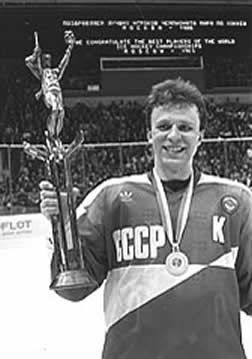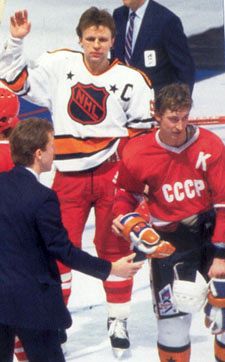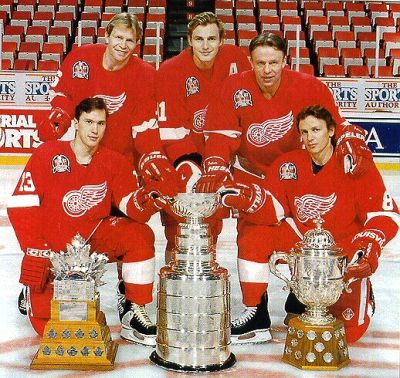Tuesday, April 20, 2010
1987 Soviet Union Viacheslav Fetisov Jersey
Slava Fetisov, born on this date in 1958, made his debut for CSKA Moscow in the Soviet Championship League in 1978-79 and scored 29 points in 29 games as a defenseman. Three years later Fetisov would earn the honor of being named the 1982 Soviet Player of the Year. Four years later he would again be named the Soviet Player of the Year. In all, the would play 11 seasons with CSKA Moscow, more commonly known in North America as the Soviet Red Army Club.
In each of his 11 seasons with Red Army, they would win the Soviet Championship League title.
Prior to joining the senior Red Army Club, Fetisov represented the Soviet Union at the European Junior Championships, earning Top Defenseman at the 1976 tournament, in which he won the first of his many international gold medals. He also won gold at the 1976 World Junior Championships the same year, a feat he repeated in 1977 with gold medals in both the European and World Juniors, where he was named Best Defenseman.
1978 saw his third consecutive World Junior gold and second Best Defenseman award. Later that year Fetisov won his first gold medal with the Soviet National Team at the World Championships. Fetisov was also a member of the Soviet squad that was upset at the 1980 Olympics in the "Miracle on Ice", which eventually earned a silver medal. Another gold at the World Championships arrived in 1981 followed by winning the Canada Cup later that year. Two more golds followed in the 1982 and 1983 World Championships before his first gold medal at the 1984 Olympics in Sarajevo, Yugoslavia.
1985 saw a bronze medal at the World Championships break the string of golds. Order was restored in 1986 with a gold.
Fetisov next played for the Soviet Union in Rendez-vous '87, a two game series that took the place of the usual NHL All-Star Game in 1987. The conclusion of the series led to a memorable jersey moment, as Fetisov and Gretzky swapped jerseys, a common practice among European soccer players.
A silver medal followed in the 1987 World Championships before Fetisov would take part in his second Canada Cup tournament later in the year. The 1988 Winter Olympics saw Fetisov win a second Olympic gold medal in Calgary. His sixth World Championship gold came in 1989.
At this point in Fetisov's career, he had 11 Soviet Championships, a pair of Player of the Year awards, two European Junior golds, three World Junior golds, six golds, one silver and one bronze medal at World Championships, a Canada Cup championship and two Olympic gold medals and one silver, but there was one championship trophy he was not eligible to compete for - the Stanley Cup.
Around the time of the 1989 World Championships, Sergei Priakin, considered expendable by the Soviet National Team, was allowed by Soviet authorities to play for the Calgary Flames in the NHL. Looking to escape the rigid Soviet system and the iron hand of coach Viktor Tikhonov, whose 11 month a year training schedule had grown more than tiresome, the now 31 year old Fetisov also requested to be allowed a move to the NHL.
He met with great resistance at first, but with a new policy of openness now taking hold in the Soviet Union, as well as the Soviet officials desire for an influx of cash, Fetisov, along with seven other players, were allowed to leave for North America, with the stipulation that they continued to compete internationally for the Soviet Union.
Originally drafted by the Montreal Canadiens in 1978, Fetisov's name was put back into the draft in 1983 when he was selected by the New Jersey Devils. The new Soviet players had an immediate impact on the NHL, even as they dealt with various instances of culture shock and a less than warm welcome by Canadians who felt their jobs were being taken.
"For the first 25 games or so, my partners didn't understand my style and I didn't understand the style of the NHL, but we all learned a lot and I thought I had a very good second half," said Fetisov. "It was tough to get out of the country, to fight against a Communist system. And it was tough when I got here (the NHL) for a couple years," Slava admitted. "Many times I would think, 'Why am I here; why did I do it?' I was a big player in Europe and people knew me. Here, all of a sudden, I had to struggle. But I keep telling myself I have to fight through this stuff."
Fetisov scored a career high 42 points during his first North American season, while compatriot Sergei Makarov was named the recipient of the Calder Trophy.
The move to North America had great meaning to Fetisov, beyond just the opportunity to earn a larger paycheck. "It was a victory against a whole system," Fetisov said. "It was not easy. You always have to fight for everything and I fought for everything I have in hockey. I also won the biggest fight away from hockey. That was the fight against communism, the fight for freedom of choices."
In keeping with the agreement, following the Devils elimination from the Stanley Cup playoffs, Fetisov won his seventh and final gold medal at the 1990 World Championships.
Fetisov would play four additional seasons for New Jersey, as well as his final appearance for the Soviet Union in 1991 World Championships where he would the second bronze medal of his career, before a move to the Detroit Red Wings during the 1994-95 season.
Once in Detroit, the Red Wings advanced to the Stanley Cup Finals, only to lose to Fetisov's former club, the Devils. In 69 games with Detroit the following season, Fetisov would equal his NHL career high with 42 points. Additionally, the Red Wings would again make a strong playoff push, eventually losing in the Conference Finals to the eventual champion Colorado Avalanche. Prior to the start of the following NHL season, Fetisov would conclude his international career by playing for Russia for the first and only time at the 1996 World Cup of Hockey.
It all came together for the Red Wings in 1997, as Fetisov, as part of the famed "Russian Five", won the 1997 Stanley Cup with a four game sweep of the Philadelphia Flyers.
The victory made him and long-time teammate Igor Larionov the only men to have ever won the Stanley Cup, the World Championship, an Olympic gold medal, the World Junior Championship and the Canada Cup. The Canada Cup evolved into the World Cup of Hockey, and Joe Sakic and Scott Niedermayer joined the two Russians as winners of the five most important championships in the world of hockey.
Following the Stanley Cup victory celebrations in 1997, Fetisov was involved in a limousine crash which ended the career of teammate Vladimir Konstantinov and quite nearly cost him his life. Fetisov escaped with relatively minor injuries and continued his playing career, which included an emotional repeat championship for the Red Wings in 1998, which cumulated in a memorable scene on the ice as a wheelchair bound Konstantinov was included in the Stanley Cup presentation following the Red Wings victory. It would be the final game of Fetisov's NHL career.
He would retire with 367 games played in the Soviet Union, scoring 339 points, and 546 games in the NHL, mainly due to the much longer NHL schedule despite playing two seasons more in the Soviet Union, in which Fetisov scored 228 points.
Fetisov has won numerous awards in his home country, including the Order of Lenin in 1988 and even had an asteroid named for him. In the world of hockey, Fetisov was inducted into the Hockey Hall of Fame in 2001. "I just couldn't believe it when they called me," said Viacheslav. "It's a great honour. You play all your life to get the recognition and it feels great, especially being a Russian-born hockey player and spending most of the best years back in Europe. It's a great honour to be in same category as other legends. I have achieved everything I dreamed of in my childhood," said Fetisov.
In 2008, Fetisov was named to the IIHF's International Centennial All-Star Team, which named but five players to create the finest starting lineup of the century, with Fetisov receiving 54 of a possible 56 votes, with no other player earning more than 38.
Today's featured jersey is a ProJoy 1987 Soviet Union Viacheslav Fetisov jersey as worn in the 1987 Canada Cup.
ProJoy admittedly did not make the best quality jerseys when compared to later CCM, Starter and ProPlayer jerseys, but they did tackle subject matter seldom seen produced by any other manufacturer, such as the Cleveland Barons and this unique style of CCCP jersey.
Be sure to notice how the actual Adidas jerseys had their trademarked three white stripes running down the sleeves in the first video below, while the ProJoy version above has three red and only two white stripes, to avoid running afoul of the legal team at adidas.
This jersey, with it's striking design for the normally spartan Soviet jerseys of the era, was purchased blank and then later expertly customized with period correct flocked numbers in the proper font and there's nothing we at Third String Goalie find cooler than a Soviet jersey with a captain's "K" on the chest.
Today's video segment includes the goals from the thrilling final game of the 1987 Canada Cup, which features the Soviets wearing today's featured jersey.
Here is footage from the Slava Fetisov Farewell Hockey Game which took place in Russia. See if you can recognize any NHL stars in the footage.
In this brief highlight, Fetisov slices and dices Team Canada and scores easily after a coast to coast rush.
We conclude today with a tribute video to Fetisov, which includes some amazing footage of his time in the Soviet Union, much of which we have never seen before as well as some of the original red and green New Jersey Devils jerseys. Highly recommended, but perhaps with the sound off...
Labels:
Fetisov Viacheslav,
Soviet Union
Subscribe to:
Post Comments (Atom)
















I wish he could stay just the hockey player. His career as sports minister, senator and the CSKA president/co-owner was far from the success of his ice victories. His come-back this year into professional game was a big hit but more on the PR side though:
ReplyDeletehttp://www.youtube.com/watch?v=Z51Me672mB0
And by the way, on the jerseys side: currently in KHL CSKA is the only club that plays in jerseys made by Forward, the company fully controlled by Slava Fetisov... Lutch was better IMHO.
Another great material on the Soviet/Russian hockey!
We are big fans of Lutch jerseys here and have more than a few in our collection.
ReplyDelete